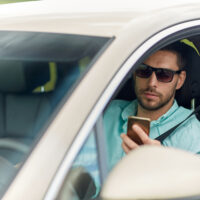Obtaining Compensation in Device Distraction Claims

Most people multitask their way through each day. A friend once told me she could feed her infant child, cook dinner, talk on the phone, and yell at her older children all at the same time.
But behind the wheel, such multitasking is very hazardous. Driving already involves multitasking. Operators must almost simultaneously watch the road, their mirrors, and their gauges. Adding another task, like using a wireless device, is too much. So, it is little wonder that distracted drivers cause roughly 1,000 serious injury crashes every day.
If a distracted driver hit you, Florida law offers several different options, depending on the facts of the case.
Non-Injury Crashes
Florida still has a no-fault insurance law. So, if a distracted driver hit you and caused only property damage, you may be able to file a claim with your own auto insurance company.
The company typically cannot raise your rates because you file a PIP claim. Such claims should pay for damage to your vehicle and perhaps some other tangible losses as well.
If you sustained an injury that required a hospital visit and/or your car was not drivable after the accident, a no-fault claim may not be the way to go.
Distracted Driving Duty of Care
Generally, noncommercial drivers have a duty of reasonable care. The exact nature of that duty depends on the laws in a given area.
Sometimes, a statute establishes the standard of care. Florida lawmakers recently passed a limited hands-free cell phone law. Operators cannot talk on their phones while they drive. And, they cannot send or review any text-based messages while they are behind the wheel, even if traffic is not moving. A total hands-free law went into effect on October 1. This law makes it illegal to hold a device in a school zone.
Other times, the so-called “neighbor principle” establishes the duty of care. In Donoghue v. Stevenson, a case from the 1930s, a court famously ruled that people had a duty to avoid injuring their neighbors. The neighbor principle later became the duty of care in Florida.
In this context, the duty of care requires operators to concentrate on the road and not use their phones as they drive.
Negligence Per Se
If the tortfeasor (negligent driver) violates a safety law, and that violation substantially causes a crash, the tortfeasor could be liable for damages as a matter of law. Caution, or the lack thereof, is completely irrelevant. So, if the tortfeasor received a citation for distracted driving, this principle may apply.
In some cases, negligence per se is only a presumption of negligence. To obtain compensation for damages victim/plaintiffs must introduce additional evidence of negligence. For example, many drivers violate other safety laws, such as failure to maintain a single lane, if they use their phones while driving.
Ordinary Negligence
Talking and texting are not the only forms of device distraction. In fact, hands-free devices may be even more dangerous than hand-held devices, from a distracted driving perspective.
Hands-free devices are distracting. Operators who use them take their eyes off the road and take their minds off driving. Furthermore, there is a device latency effect. After they stop using a hands-free phone, most drivers require at least ten seconds to fully re-engage with driving. Finally, hands-free phones give operators a false sense of security, so they may take more chances behind the wheel.
If the tortfeasor was negligent, the tortfeasor may be liable for damages. In serious injury collisions, these damages usually include compensation for economic losses, such as medical bills, and noneconomic losses, such as pain and suffering.
Contact an Experienced Lawyer
Distracted drivers often cause extremely serious injuries. For a free consultation with an experienced Port St. Lucie personal injury attorney, contact Eighmie Law Firm, P.A. Home and hospital visits are available.
Resource:
cdc.gov/motorvehiclesafety/distracted_driving/index.html
https://www.eighmielawfirm.com/the-five-kinds-of-driving-impairment/


